Quranic View on Creation of the Universe
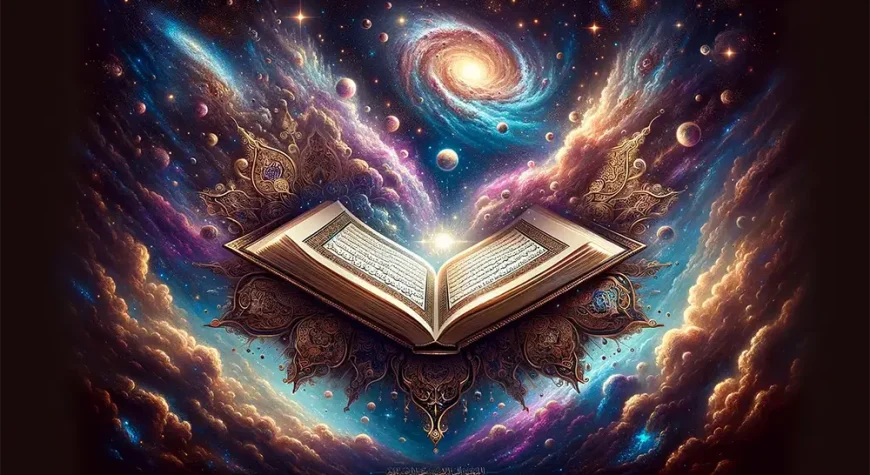
Introduction: The Quran and Cosmology
The Quran, a cornerstone of the Islamic faith, offers profound insights into many aspects of life and the universe. Among these, the concept of the creation of the universe holds a special place in Islamic cosmology. It not only shapes the understanding of the universe’s origin but also reinforces the faith of a Momin in the unparalleled power of Allah (اللّٰه). In this exploration, we delve into various Quranic verses that shed light on how the universe was created, juxtaposing these teachings with modern scientific discoveries and understanding their significance for a “MominToBe” and seasoned believers alike.
The Concept of Creation in Islam
The Role of Allah in Creation
In the Islamic faith, the creation narrative centers profoundly around Allah (اللّٰه), revered as the omnipotent and omniscient. The Quran, Islam’s holy scripture, elucidates this in numerous verses, with a prominent example being,
Indeed, your Lord is Allāh, who created the heavens and earth in six days and then established Himself above the Throne. He covers the night with the day, [another night] chasing it rapidly; and [He created] the sun, the moon, and the stars, subjected by His command. Unquestionably, His is the creation and the command; blessed is Allāh, Lord of the worlds.
(Quran 7:54)
This verse not only highlights the power and capability of Allah but also sets a foundational belief in Islam about the origins of the universe.
Allah as Al-Khaliq (The Creator)
The title Al-Khaliq (Arabic: الخالق) translates to ‘The Creator’, a designation that embodies Allah’s role as the sole architect of existence. This attribute is significant in the Islamic understanding of the cosmos. It underscores a central tenet of Islam: that every element of the universe, from the smallest particle to the vast expanses of space, is a deliberate and thoughtful creation of Allah. This concept fosters in believers a profound reverence for the natural world as a manifestation of divine craftsmanship.
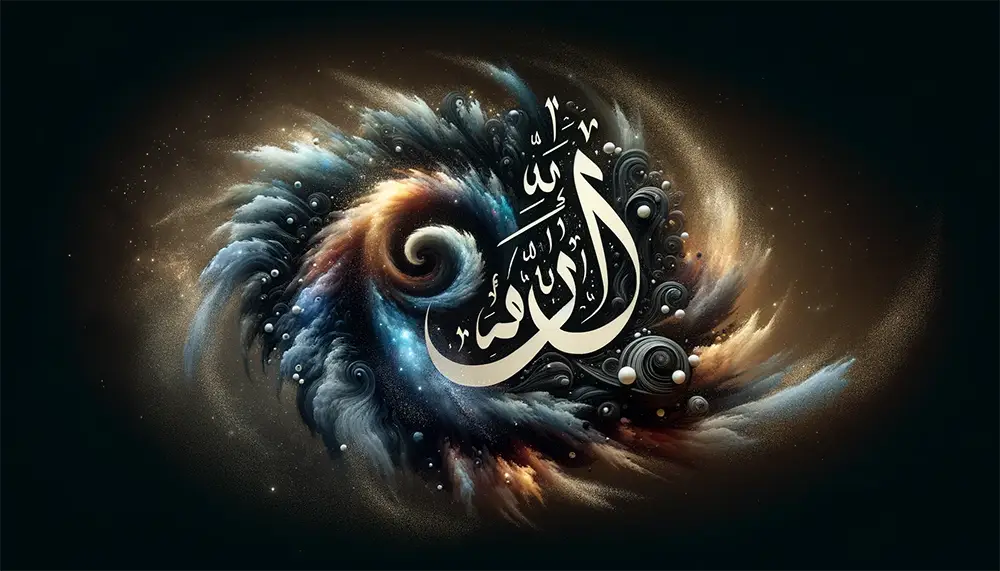
Al-Khaliq: The Creator’s artistry in the cosmos
Manifestation of Divine Attributes in Creation
In the realm of Islamic theology, the universe’s creation is not just a demonstration of power but also of the other attributes of Allah, such as Al-‘Aleem (The All-Knowing) and Ar-Rahman (The Merciful). These attributes are reflected in the intricate and balanced design of the cosmos, suggesting not only omnipotence but also omniscience and benevolence in creation.
Creation: A Reflection of Divine Wisdom
Quranic Insights into Divine Wisdom
The Quran is replete with verses that reflect on the wisdom and might of Allah in creation. For instance,
He is Allah, the Creator, the Inventor, the Originator-Of-Shapes. His are the Most Beautiful Names. His purity is proclaimed by all that is in the heavens and the earth, and He is the All-Mighty, the All-Wise.
(Quran 59:24)
encapsulates the multifaceted role of Allah as the originator and shaper of the universe. This verse, among others, serves as a reminder of the meticulous and intentional nature of creation, pointing to a divine wisdom that transcends human understanding.
The Universe as a Sign of Allah’s Power
The Quran frequently refers to the natural world as ‘Ayat‘ (signs) of Allah’s existence and might. In exploring the creation of the universe, one is often guided to reflect on the grandeur and complexity of the cosmos as indicators of a higher, divine intelligence at work. This reflection is not just a theological exercise but also an encouragement for Momins to seek knowledge and understanding of the universe as a way to appreciate and connect with Allah.
Integration with Scientific Understanding
While rooted in faith, the Islamic narrative of creation is not at odds with scientific inquiry. In fact, verses from the Quran that speak of the creation of the universe often stimulate curiosity and exploration among believers. The encouragement to ponder upon the heavens and the earth resonates with the spirit of scientific discovery, suggesting that in the Islamic worldview, faith and science can coexist harmoniously.
Quranic Insights into the Universe’s Creation
Analyzing Key Verses
The Quran, in its rich tapestry of guidance and wisdom, provides numerous verses that offer insights into the creation and nature of the universe. A pivotal verse in this context is,
And the heaven We constructed with strength, and indeed, We are [its] expander.
(Quran 51:47)
This verse not only speaks to the power and majesty of Allah (اللّٰه) in creating the heavens but also intriguingly hints at the concept of an expanding universe, a notion that aligns remarkably with modern astronomical findings.
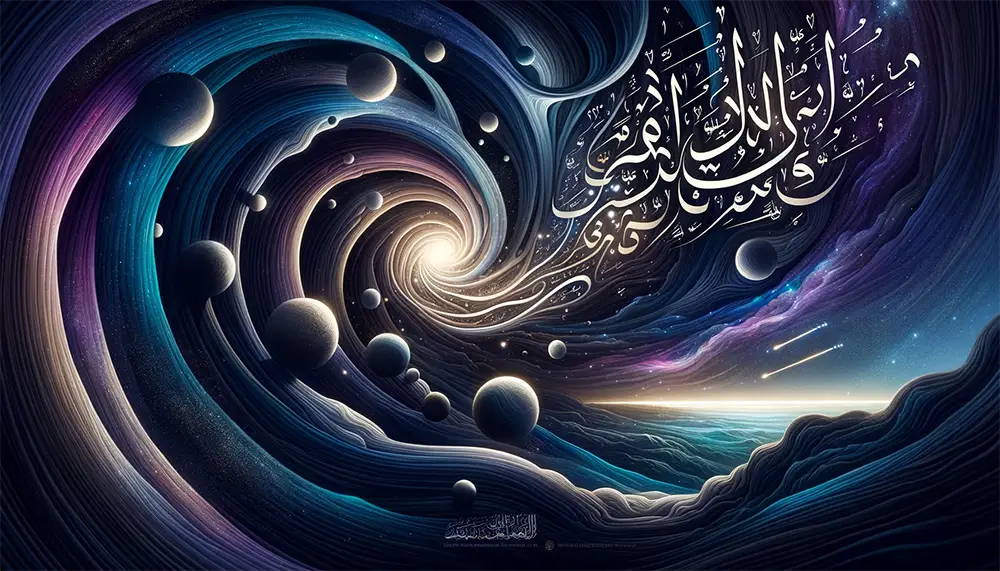
isual representation of Quran 51:47 and the expanding universe
Interpreting ‘The Expanding Universe’
The phrase “We are [its] expander” has garnered significant attention, especially in light of recent scientific discoveries. It suggests that the universe, created by Allah, is not static but is continuously expanding. This interpretation aligns with the 20th-century discovery in cosmology that the universe is indeed expanding, a realization that has revolutionized our understanding of the cosmos.
The Strength in Creation
The part of the verse stating “the heaven We constructed with strength” reflects the idea of the universe being a robust and well-ordered system. This aligns with the Islamic view that the cosmos is a creation of great precision and stability, an idea that resonates with the modern scientific understanding of the laws governing the universe.
Scholarly Interpretations
Islamic scholars have long pondered over these verses, offering interpretations that blend theological understanding with a curiosity about the natural world. Their insights provide a deeper layer of meaning to these Quranic verses, bridging faith and scientific inquiry.
Classical and Contemporary Views
Classical scholars like Ibn Kathir and Al-Ghazali have provided foundational interpretations of these verses, often focusing on the might and wisdom of Allah in creation. Contemporary scholars, however, have also delved into the compatibility of these verses with scientific theories, such as the Big Bang and the expansion of the universe.
Integrating Science and Scripture
Many modern Islamic scholars advocate for a reading of the Quran that is harmonious with scientific understanding. They argue that verses like Quran 51:47 do not contradict scientific discoveries but rather, they anticipate and align with them. This approach not only enriches the faith of believers but also encourages a pursuit of knowledge in the fields of astronomy and physics.
The Expanding Universe: Quranic Perspective and Modern Science
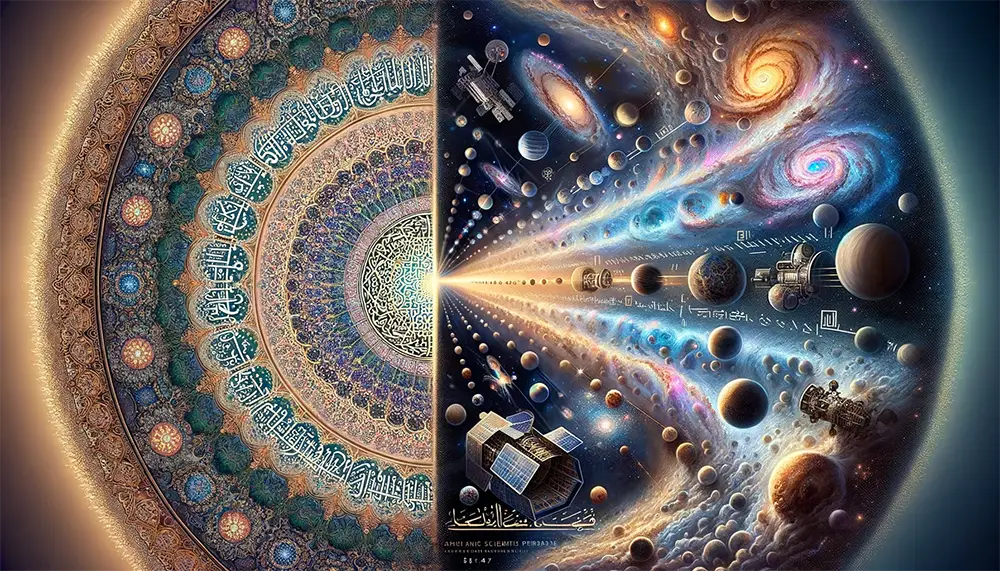
Fusion of Quranic wisdom and modern science on the universe’s expansion
Quranic Mention of an Expanding Universe
The Quranic verse,
And the heaven We constructed with strength, and indeed, We are [its] expander.
(Quran 51:47)
has been a focal point of discussion among scholars and scientists alike. This verse intriguingly suggests a concept that resonates with modern scientific discoveries: the expansion of the universe.
Interpreting the Verse in a Modern Context
In this verse, the Arabic word “موسعون” (translated as ‘expander’) is particularly noteworthy. It implies an ongoing process, suggesting that the expansion of the universe is a continuous phenomenon. This interpretation aligns closely with the current scientific understanding of the universe’s expansion, a concept that was not known until the 20th century.
Scientific Correlation
Discovery of the Expanding Universe
The modern scientific discovery of the expanding universe, first proposed by Georges Lemaître and later supported by Edwin Hubble’s observations, fundamentally changed our understanding of the cosmos. Hubble observed that distant galaxies are moving away from us, indicating that the universe is expanding.
The Quran and Modern Cosmology
The correlation between Quran 51:47 and the scientific discovery of the expanding universe is striking. This alignment has been pointed out by both Islamic scholars and scientists. For instance, Dr. Nidhal Guessoum, an astrophysicist, has noted how this verse remarkably parallels modern scientific findings.
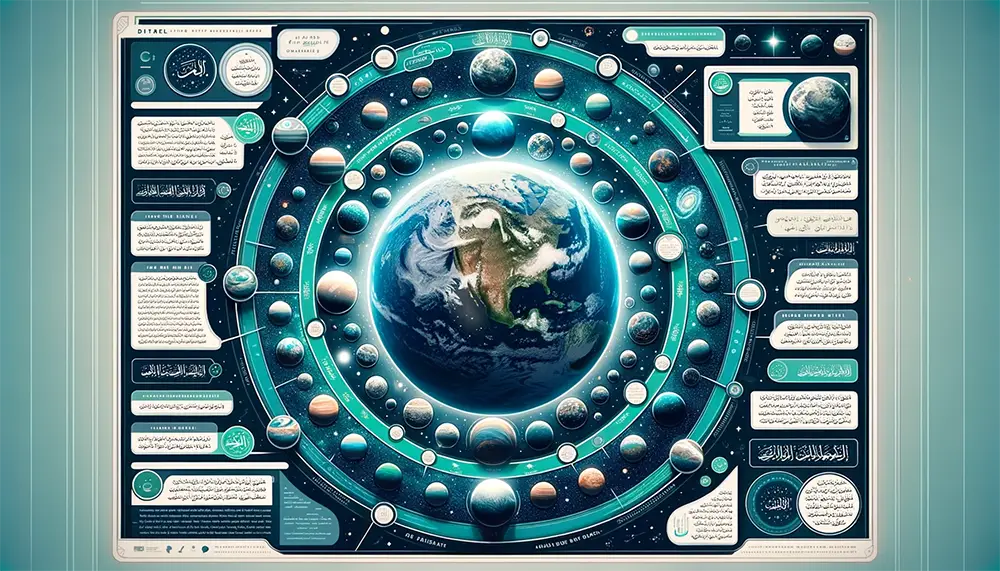
Infographic of Quranic verses on the cosmos
A Reflective Approach to Science and Faith
The apparent consonance between the Quranic verse and scientific discoveries encourages a reflective approach to both faith and science. It suggests that religious texts and scientific inquiry can coexist, each offering valuable insights into the nature of the universe.
Allah’s Mastery Over the Universe: Lessons for Momins
Deepening Faith Through Understanding
The Quranic view of the universe is not merely an account of cosmic creation but a foundation for deepening a Momin’s faith. Understanding how Allah (اللّٰه) masterfully created and continues to govern the universe can significantly enhance a believer’s connection with the divine.
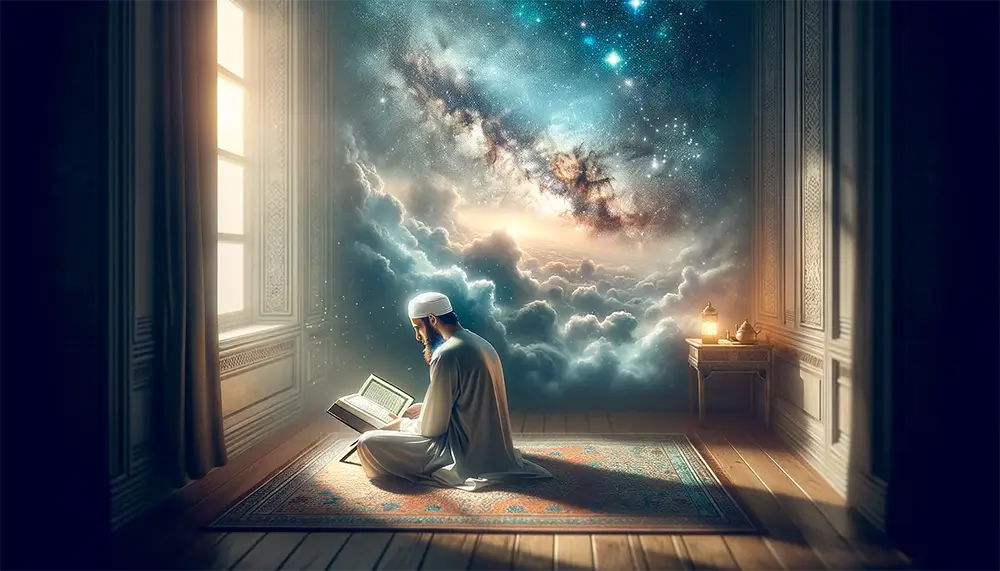
A Momin’s journey through Quranic cosmos
The Magnitude of Creation and Its Impact on Faith
When Momins reflect on verses such as
Indeed, your Lord is Allāh, who created the heavens and earth in six days and then established Himself above the Throne. He covers the night with the day, [another night] chasing it rapidly; and [He created] the sun, the moon, and the stars, subjected by His command. Unquestionably, His is the creation and the command; blessed is Allāh, Lord of the worlds.
(Quran 7:54)
they are reminded of the vastness and complexity of the universe. This realization fosters a profound sense of awe and reverence for Allah’s omnipotence, deepening their faith and spirituality.
The Universe as a Sign of Allah’s Existence
The Quran often refers to the natural world as ‘Ayat’ (signs) of Allah’s existence. For a Momin, understanding the intricacies of the universe as detailed in the Quran reinforces the belief in Allah’s existence and omnipresence. This understanding is a powerful tool in strengthening one’s Iman (faith).
Practical Reflections for Momins
Living with Awareness of Allah’s Creation
For Momins, appreciating the universe’s creation goes beyond theoretical understanding. It involves recognizing Allah’s hand in everyday life and the natural world. This awareness can lead to a more mindful and grateful approach to life, seeing the beauty and precision in creation as constant reminders of Allah’s greatness.
Applying Quranic Lessons in Daily Life
The Quranic view of the universe also provides practical lessons for Muslims. It encourages a lifestyle that respects and preserves the natural world, in line with the Islamic principles of stewardship (Khalifah) over Earth. This approach can manifest in actions as simple as conserving resources and as profound as engaging in scientific pursuits to explore and understand the universe further.
The Role of Gratitude and Humility
Understanding the vastness of the universe and our small place within it fosters humility and gratitude in a Momin’s heart. These feelings are integral to Islamic teachings and can lead to a more compassionate and empathetic way of interacting with others and the world.
The Role of Muhammad Rasool Allah ﷺ in Islamic Cosmology
The Messenger of Cosmic Knowledge
Prophet Muhammad ﷺ, revered in Islam as the final messenger of Allah (اللّٰه), played a pivotal role in shaping the Islamic understanding of the cosmos. His teachings and Hadiths (sayings of the Prophet) provide valuable insights into Islamic cosmology, linking the creation and functioning of the universe to divine wisdom.
Conveying the Quranic Revelations
Prophet Muhammad’s ﷺ primary contribution to Islamic cosmology was his role in conveying the Quran. The revelations he received and imparted include numerous verses about the creation and expanse of the universe. His faithful transmission of these verses has been instrumental in shaping the Islamic view of the cosmos.
The Hadiths: A Supplement to Quranic Teachings
Beyond the Quran, the Hadiths of Prophet Muhammad ﷺ offer additional perspectives on the universe. These sayings, while not a part of the Quran itself, are considered crucial for understanding Islamic teachings and include the Prophet’s reflections on the natural world.
His Teachings on the Universe
Hadiths Reflecting on the Cosmos
In various Hadiths, Prophet Muhammad ﷺ discussed aspects of the universe, providing guidance and wisdom. For instance, he spoke about the magnificence of the heavens and the earth, urging believers to reflect on the creation as a sign of Allah’s power and majesty.
Integration of Science and Spirituality
The teachings of Prophet Muhammad ﷺ encourage a harmonious relationship between scientific understanding and spiritual beliefs. He advocated for the pursuit of knowledge, including understanding the natural world, as a form of worship and a means to appreciate Allah’s creation.
The Ethical Dimensions of Cosmic Understanding
Prophet Muhammad’s ﷺ teachings also include ethical considerations related to the cosmos. He emphasized the importance of respecting the environment and utilizing natural resources responsibly, reflecting the Islamic principle of stewardship (Khalifah) over the earth.
Contemporary Relevance: The Quranic Universe in Today’s World
The Timelessness of Quranic Teachings
In the rapidly advancing world of today, the teachings of the Quran regarding the universe maintain their relevance and significance, transcending the boundaries of time and technological progress.
Enduring Wisdom in a Changing World
Despite the passage of centuries since the Quran’s revelation, its verses pertaining to the cosmos continue to resonate with both believers and scholars. The Quran’s descriptions of the universe’s creation and structure remain profound, offering wisdom that aligns with many modern scientific understandings.
Guidance for Modern Challenges
The Quranic teachings about the universe also provide ethical and moral guidance relevant to contemporary issues such as environmental conservation and responsible scientific exploration. This aspect underscores the Quran’s role as a timeless guide for humanity.
Bridging Faith and Science
Harmony Between Quranic Insights and Scientific Discoveries
The Quranic view of the universe is not only compatible with modern scientific understanding but often provides a complementary perspective. For example, the Quran’s mention of the expanding universe predates scientific discovery, showcasing a remarkable intersection between faith-based insights and empirical knowledge.
Encouraging the Pursuit of Knowledge
The Quran advocates for the pursuit of knowledge, including the study of the natural world. This encouragement aligns with the principles of scientific inquiry, demonstrating that faith and reason can coexist and enrich each other.
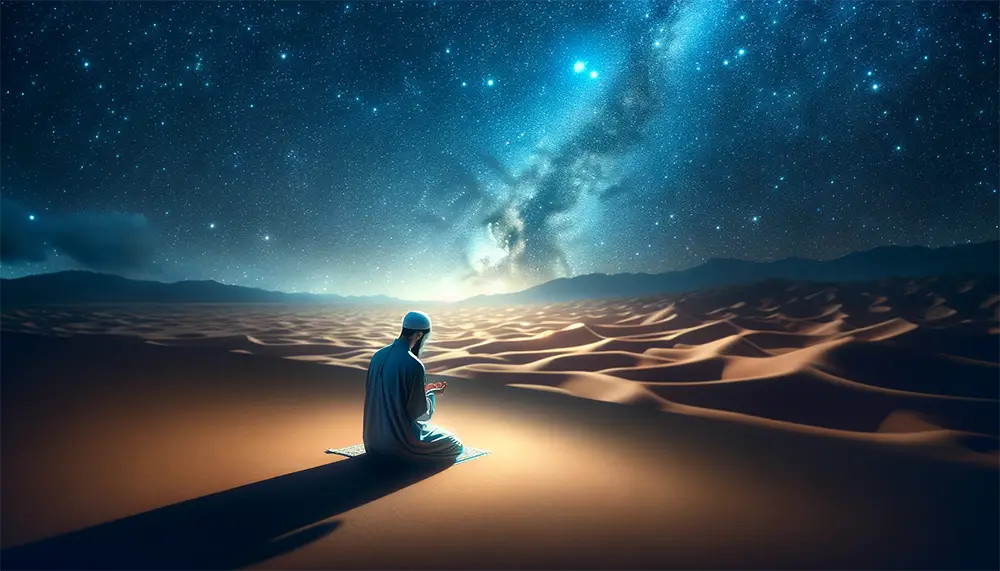
Reflecting on the divine cosmos a moment of spiritual connection
Conclusion: Embracing the Quranic Universe
In conclusion, the Quranic perspective on the universe is not just a component of Islamic cosmology but a source of continuous inspiration and wonder. These teachings, blending faith with empirical knowledge, urge Momins to contemplate the majesty of Allah’s creation. Embracing these teachings enables believers to find deeper meaning in their faith and a more profound connection with the cosmos. The Quranic universe, thus, remains a beacon of wisdom and guidance in the modern world, bridging the gap between ancient scripture and contemporary scientific understanding.
Frequently Asked Questions
1. What does the Quran say about the creation of the universe?
The Quran describes the creation of the universe as an act of Allah (اللّٰه), emphasizing His power and wisdom. Verses like “Indeed, your Lord is Allah, who created the heavens and the earth in six days…” (Quran 7:54) and “And the heaven We constructed with strength, and indeed, We are [its] expander.” (Quran 51:47) reflect this view.
2. Does the Quran mention the expanding universe?
Yes, the Quran mentions the expanding universe. Quran 51:47 states, “And the heaven We constructed with strength, and indeed, We are [its] expander,” which many scholars and scientists interpret as a reference to the expansion of the universe.
3. How do Islamic teachings relate to modern science?
Islamic teachings, particularly those in the Quran, often show a remarkable compatibility with modern scientific knowledge. For example, the Quranic view of the universe, including its creation and expansion, aligns closely with current astronomical findings.
4. What is the significance of Prophet Muhammad’s ﷺ teachings in Islamic cosmology?
Prophet Muhammad’s ﷺ teachings and Hadiths play a crucial role in Islamic cosmology. They provide insights into the creation and nature of the universe, complementing the Quranic verses and offering guidance on understanding the cosmos from an Islamic perspective.
5. How can understanding the Quranic view of the universe deepen a Muslim’s faith?
Understanding the Quranic view of the universe can deepen a Muslim’s faith by fostering a sense of awe and reverence for Allah’s creation. It encourages believers to reflect on the magnificence and complexity of the cosmos, thereby strengthening their belief in Allah’s omnipotence.
6. Are the Quranic teachings about the universe relevant today?
Yes, the Quranic teachings about the universe remain highly relevant today. They offer not only a spiritual perspective but also ethical guidance on contemporary issues like environmental conservation and responsible scientific exploration.
Lorem Ipsum

